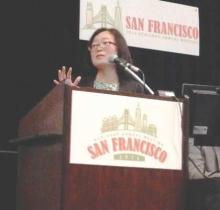SAN FRANCISCO – Protection against shingles appeared to wane about 5 years after patients with autoimmune diseases received the live herpes zoster vaccine, according to a large retrospective cohort study presented at the annual meeting of the American College of Rheumatology.
In contrast, shingles risk remained fairly constant among unvaccinated patients during 7 years of follow-up, reported Dr. Huifeng Yun of the department of epidemiology at the University of Alabama at Birmingham. “Our findings suggest that patients might benefit from a booster vaccine at some point after initial vaccination, but further research is needed to determine when and if such a strategy is effective at preventing herpes zoster,” she said.
The long-term Shingles Prevention Study showed that the live herpes zoster vaccine is effective for about a decade among healthy older individuals. But about 90% of zoster cases occur in patients with autoimmune and inflammatory diseases, for whom the duration of vaccine protection has been unclear, Dr. Yun said. “Antiviral medication approved for herpes zoster reduces the severity and duration of symptoms, but may not prevent postherpetic neuralgia,” making vaccine protection a priority, she added.
Dr. Yun and her associates retrospectively analyzed Medicare data for nearly 179,000 patients with autoimmune and inflammatory conditions between 2006 and 2013. About one-third of patients were vaccinated against herpes zoster, and more than 40% had rheumatoid arthritis, nearly one-third had psoriasis, about 20% had inflammatory bowel disease, about 5% had psoriatic arthritis, and about 1% had ankylosing spondylitis. The researchers matched unvaccinated and vaccinated patients in a 2:1 ratio based on calendar year, age, sex, race, disease type, and use of disease-modifying antirheumatic drugs, biologics, and glucocorticoids. They followed patients from 30 days after vaccination – or the corresponding date in the unvaccinated cohort – until death, first episode of herpes zoster, or the end of 2013, whichever came first.
The rates of herpes zoster among vaccinated patients rose from 0.75/100 person-years during the first year after vaccination to 1.25/100 person-years during the seventh year of follow-up, Dr. Yun said. In contrast, zoster rates among unvaccinated patients remained steady, ranging between 1.32 and 1.35 cases per 100 person-years. In an adjusted analysis of data from 2006 through 2012, vaccinated patients had about half the risk of herpes zoster, compared with unvaccinated patients, during year 1 (relative risk, 0.52) and remained significantly less likely to develop shingles until year 6, when the gap in risk between vaccinated and unvaccinated patients essentially closed (RR, 0.92).
“The herpes zoster vaccine was effective for about 5 years, and results of subgroup analyses were consistent with the main analysis,” Dr. Yun concluded. But the Medicare database lacked details on disease severity or lifestyle factors, both of which might have affected the results, she cautioned.
Dr. Yun disclosed a financial relationship with Amgen. The senior author and two coauthors also disclosed relationships with several pharmaceutical companies. Two investigators had no disclosures.


